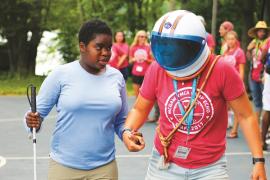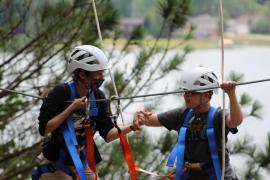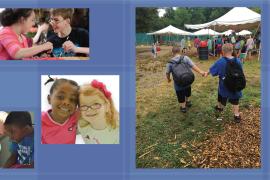When I first met Ed, I did not notice that he had no legs.
He sat straight up in a wheelchair with long pants that hung down over the edge. I did not, at the time, find the absence of shoes or feet at the ends of his trousers, remarkable. I did, however, stare, somewhat self-consciously, at the stumps that protruded from the short sleeves of his fire engine red shirt. They were the size of a child's football and had no digits. He used them to propel his wheelchair by leaning forward and pushing on the rubber tires of the big wheels that rose above his seat.
Ed had a round smooth face with small dark eyes that darted about. His hair was closely cropped. We called it a crew cut back then. He seemed to be forever taking the measure of the people and environment around him, as though it was hostile terrain and he had to be on guard.
"Take me to the bathroom," were the first words he ever spoke to me. His speech was clear, sharp, and commanding, particularly for an eleven-year-old. I obeyed without hesitation and began pushing him toward the nearest boy's cabin.
I was a first year camp counselor at Camp Oakhurst, a camp for children with physical disabilities. We had just completed a week's training that was filled with team-building activities that I imagine was typical of summer camp orientation programs all over the country. Every camp had but a few days to teach its staff what it had to know to manage the full-time responsibility of looking after children, while at the same time indoctrinating them with the philosophy and spirit that made their particular summer camp unique. It is an awesome task, particularly for a camp that has a population of children with physical challenges, many of whom need help in personal care.
I had just graduated from college and was on my way to graduate school. For the first time in my memory I had a summer "free" and, thanks to a teaching assistantship, which included a room and meal plan, I could take a job without much consideration of the salary. Needless-to-say, a not-for-profit summer camp paid a lot less than I could earn selling hot dogs in Central Park.
Ed was one of several "thalidomide babies," as they were called, who were campers that summer. (Thalidomide was a drug prescribed to pregnant women in the late 1950s and early 60s to combat symptoms associated with morning sickness. When taken during the first trimester of pregnancy, it resulted in terrible birth defects in thousands of children around the world.) During the orientation program, we also learned about children with cerebral palsy, spina bifida, osteogenesis imperfecta, and other disabilities that affected movement and coordination, but not necessarily intelligence. We spent time practicing how to push a wheelchair and transfer campers safely from a bed to a chair. The skills were basic and required some physical dexterity and strength, but mostly common sense.
Ed's congenital deformities were severe — he was born with no arms or legs but rather stumps for arms and flipper like appendages that seemed to grow out of his hips, for legs and feet. Though his disability was profound and much worse than most of the other children, you could not tell that from his facial expression or, as I was eventually to learn, from the strength of his personality.
My reaction to Ed on that first day of camp rekindled some of the fears and anxieties I felt throughout the training and orientation program, during which two staff members quit or simply slipped off in the night never to be seen again. I wondered if they knew something I didn't.
Ed was obviously under some pressure to relieve himself after the two-hour bus ride to camp from New York City. Many of the children were brought to the bus departure site from their homes by wheelchair-lift equipped vans and ambulettes. Given the organized chaos in the city, with luggage, wheelchairs, walkers, and other orthopedic appliances all having to be labeled and put on the bus before the children were carried on, I could imagine that Ed might have been in transit for four or five hours. I pushed his wheelchair faster and faster up the asphalt path toward the cabin.
The cabins are rustic structures, with eight beds on each side and a central accessible bathroom. Once we got into the cabin, which was empty, we sped to the bathroom. I grabbed a clean urinal off a shelf above the sinks. Ed squirmed around positioning his body so that I could get to the zipper. "Hurry," he commanded. Hurry I did.
I managed to get everything in place. We both sighed with relief when he began to go. We said nothing to each other. I stared at the wall. What's to say when someone else is urinating in a bottle. Bathroom conversation wasn't covered in orientation.
When it slowed to a trickle, I thought I was home free. Then I noticed the wet stain on his trousers. It was expanding slowly down his pant leg. "Hold it up, damn it," he shouted. I raised the urinal quickly in response, only to discover that it was tilted incorrectly and had deposited most of its contents into his lap. Ed looked me straight in the eye and said with piercing accuracy and plenty of sarcasm, "You're new at this."
Yes, I was a novice, as were most of the counselors who took a job at Camp Oakhurst that summer. No, I was not motivated by any cosmic force to undertake such a challenge. Yes, I liked children and was comfortable in a leadership role. No, I did not think that working at such a camp would advance my career. Yes, I felt that I was idealistic and wanted to make the world a better place. Everyone I knew in the 60s did. But no, it never occurred to me that a camp for the disabled was the place to start.
I was to discover that working at a camp for children with physical disabilities was hard, exhausting, and filled with frustration. It was also quite simply the best thing I had done with my life up to that point in time.
I get an earful when people discover I work at camp for the disabled. "You must have the patience of a saint," they often say. Hardly. Then they add, "Where do they find young people to do that kind of work?" "The same place everyone finds them," I respond, "wherever young people hang out."
The difference between those who do and those who don't is a matter more of choice and chance than gift and inspiration. Take David for example. He is twenty-one and has worked at camps for disabled children for three years. He says that the experience has "matured" him and given him a better perspective on life. His is a religious young man from Hungary who ended up at Camp Oakhurst by applying through the YMCA's International Camp Counselor Program. "It is better to give than receive," is his answer to the question of what motivates him. He finds it inspiring to see disabled children, who are struggling with incredible physical problems, smile and laugh and appreciate their lives.
Pete, an athlete, played basketball in college. His coach told him to spend one summer helping kids less fortunate than he. He had trouble with the diminished expectations in the gymnasium. Playing basketball in a wheelchair might be fun but it was not the basketball he knew and loved. He was tall and skinny and loved to dunk. When he was teaching the children to play, he would enjoy their reaction to his soft, net-only, jump shot. When he tried shooting baskets from a wheelchair, he was amazed at how difficult it was and was very impressed that some of the kids were able to score with some consistency.
Jenny was a lifeguard and had never worked with the disabled before. She refused to admit it, but some of the children frightened her. Their disabilities were so complex she thought she would never be able to get close. In time she learned to communicate with Kim, a child with cerebral palsy, who used a spelling board and could not even ambulate her own wheelchair much less walk on land. Gradually, with the use of a variety of flotation devices she got Kim to relax in the water. One day, she convinced her to try to float on her own. Remarkably, Kim succeeded for a few feet. The sense of accomplishment they shared was enormous. When Kim got an award for achievement on banquet night, Jenny was brought to tears of joy.
Bill was a player, or so he thought. Dating was his avocation. He was also a pre-med student and thought working at a special needs camp would be helpful when he applied to medical school. He dated a lot that summer, but fell in "love" with an eleven-year-old boy named Richard who had muscular dystrophy and a wicked sense of humor. In spite of Richard's irreversible gradual physical decline — he was ambulatory at age nine, but now used a wheelchair all of the time — his lust for life soared. He knew more about the Yankees than Bill, who was also a fan. He played an aggressive game of chess and could float on his back in the pool all day. He was an only child, and in a short period of time "adopted" Bill as his big brother.
At the end of the summer, Bill was shocked at the depth of feeling he experienced on saying goodbye to Richard. He knew it might be the last time they would see each other. It wasn't. Bill visited Richard several times during the year, including one trip to Yankee Stadium. When Richard and his family moved to Florida, Bill was already a second-year med student. Bill insists that his relationship to Richard, who died at age twenty-one, was crucial in making him a better doctor.
Most of the counselors I worked with that first summer at Camp Oakhurst did not go on to careers in the helping professions, though some did. Most returned to school that fall to resume their studies in art, history, science, business, engineering, pre-medicine, and pre-law. Many are now successful professionals who rarely have the opportunity of interacting with people who are physically disabled.
Nevertheless, when you talk to them they reveal that working at a camp with children who are physically challenged was a transformative experience. It changed, they say, their attitudes about life. They developed a better appreciation for success and the varieties of human achievement. They never again related to a person with disabilities with the awkwardness they once had and still see in their friends and colleagues.
And what about Ed who lived his life without arms and legs? His matter-of-fact attitude toward care-giving left in me a lasting impression. As his counselor, I was amazed at his determination to do as much for himself as was humanly possible and his apparent total lack of self-pity.
He was very competitive. During baseball, which we played with a wiffle ball and plastic bat, he insisted on holding the bat himself, wedging it between his arm stumps and his chin, and swinging it around with his entire body, while sitting in his wheelchair. He generally made contact with the ball and was elated to hit it out of the infield once. During our Olympics, he refused help during the swimming relay and came in second.
When he needed help getting into his wheelchair, he would look around for the nearest counselor and simply say, "Gimme a hand." Then, "thanks," and move on his way. Not always cooperative, Ed could be defiant. Once, it was necessary to get the director to get him out of the pool. He loved the water so very much. It was the medium that allowed him the most freedom. He enjoyed camp and cherished the friendships he made there, yet never showed any emotion on departure day.
So, why do young people work at special needs camps? Partly out of choice, partly out of chance. Children with disabilities are, after all, children first, and they deserve the same chance to have a happy childhood as anyone. The counselors who help them at summer camps play a crucial role in helping them reclaim a childhood of which circumstances beyond their control have worked to steal. In so doing, these young persons enrich their own lives in ways it may take years to appreciate. They go home with a better understanding of what is important in life, and they learn how not to let circumstances beyond their control diminish its glory.
Marvin A. Raps is the executive director of the New York Service for the Handicapped/Camp Oakhurst in New York City.
Originally published in the 2004 September/October issue of Camping Magazine.



